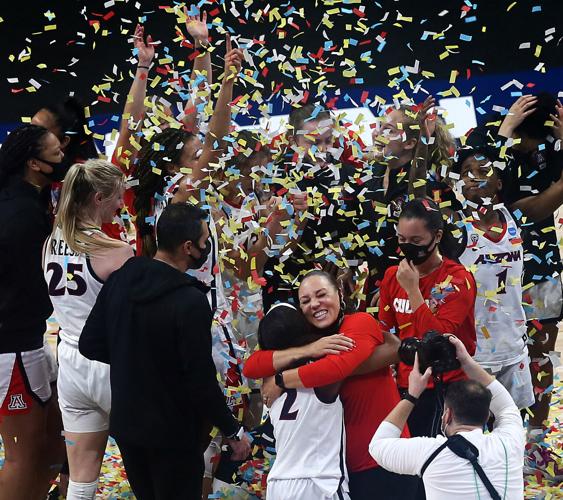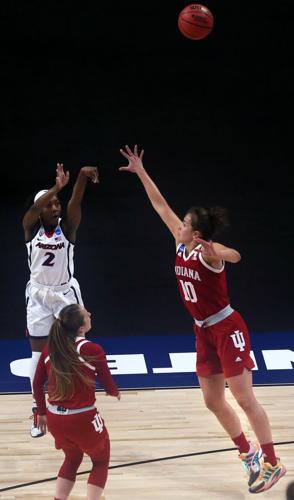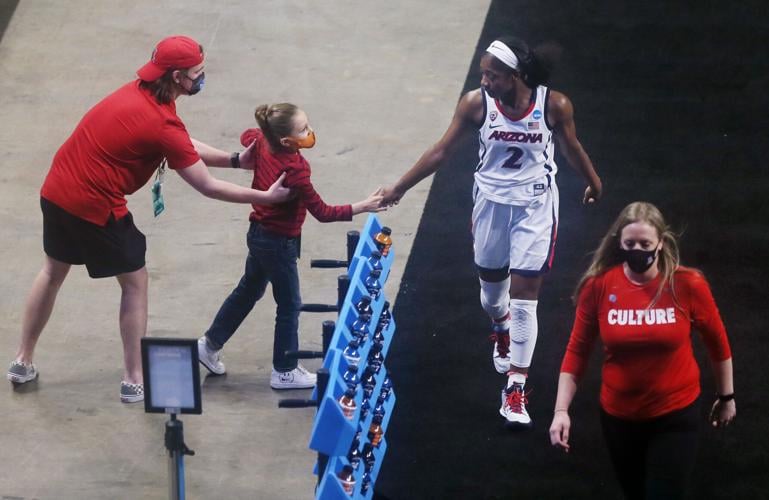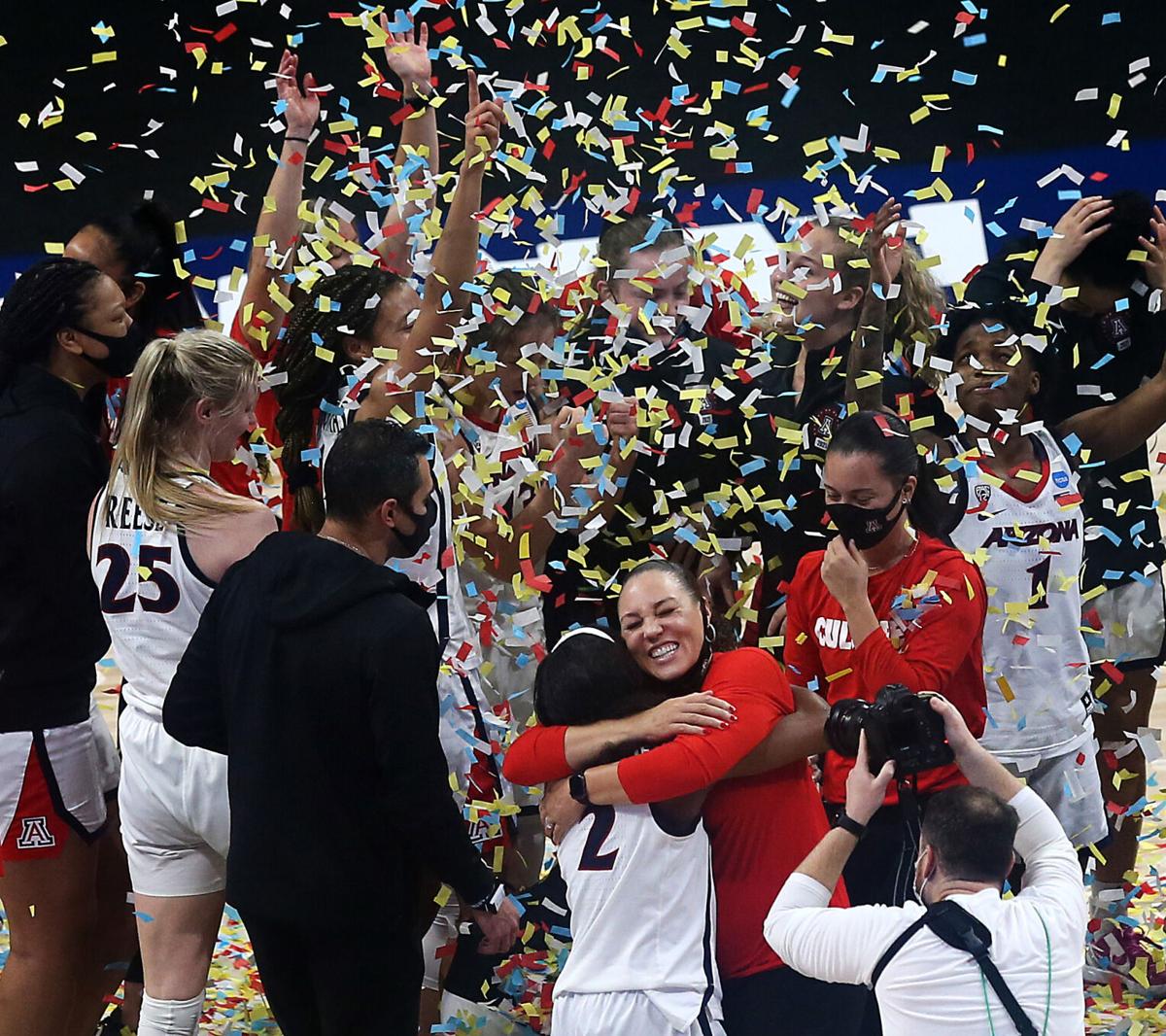On March 29, 1983, Lute Olson became Arizona’s men’s basketball coach. Adia Barnes was 6.
On March 29, 1997, Olson’s basketball team beat No. 1 seed North Carolina to reach the national championship game. Barnes was 20, the leading scorer on Arizona’s women’s basketball team, winner of its first-ever NCAA Tournament game two weeks earlier.
On March 29, 2021, seven months after Olson died, Barnes coached Arizona to the Final Four, beating Indiana.
How’s that for coming full circle? How’s that for chance, coincidence and basketball destiny?
✂️✂️✂️ https://t.co/lxRE4tP3uc
— The Wildcaster (@TheWildcaster) March 30, 2021
Olson qualified for his last Final Four in downtown San Antonio in March 2001. Almost 20 years to the day later, Barnes coached the Wildcats to the Final Four in downtown San Antonio, beating Indiana 66-53.
Much like the greatest icon in Tucson sports history, Barnes will never have to deal with “what might have been.’’ She will never be tormented by the woulda-coulda-shoulda culture that so dominates sports.
She won the Big One. Her team won the Big One. The sun will never set on what the Wildcats accomplished Monday, it will live on like the March afternoon, 1988, when Steve Kerr and Sean Elliott led Arizona to its first Final Four, beating North Carolina in Seattle.
It took Olson five years to reach the Final Four. It took Barnes five years to reach the Final Four.
Do you believe in karma? Why not? It’s more fun that way, connecting Olson with Barnes, rebuild to rebuild, San Antonio to San Antonio, Final Four to Final Four.
SAY HER NAME!!!!! pic.twitter.com/e7KoWYE5ty
— Arizona Women's Basketball (@ArizonaWBB) March 30, 2021
The difference between Barnes’ win over Indiana and Olson’s win over North Carolina is that the Wildcats flew home, rushed to McKale Center and celebrated, hoisting a trophy in front of 14,000 exhilarated late-night fans.
Arizona’s celebration in San Antonio was not as noisy — the Pride of Arizona pep band was 870 miles away — but the exhilaration was surely the same.
Years from now you’ll say you saw Aari McDonald pull the equivalent of a Kirk Gibson-limping-to-the-plate scenario, overcoming a theatric ankle injury in the last three minutes. If it’s possible, it one-ups the same way you saw Miles Simon and Gilbert Arenas and Damon Stoudamire lead Arizona’s men’s team to 1994, 1997 and 2001 Final Fours.
It looked familiar, didn’t it? It was the same blend of perseverance, ambition and talent coming together at exactly the right time.

Arizona Wildcats guard Aari McDonald (2) shoots for a three as she's defended by Indiana Hoosiers forward Aleksa Gulbe (10) in the first half during the Elite Eight NCAA Tournament regional final game at The Alamodome in San Antonio, Texas on March 29, 2021.
McDonald has rearranged the Mount Rushmore of Arizona women’s athletes. She now takes a place opposite golfer Annika Sorenstam, softball player Jennie Finch and distance runner Amy Skieresz as the four Wildcat female athletes to rise to a rarified air.
If there is any sadness, it’s that henceforth we’ll refer to McDonald in the past tense, the same way we do Finch, Sorenstam and Skieresz. But there are no regrets.
Each got the most out of their ability. You’ll say you were a witness as McDonald played basketball the same way you say you saw Finch pitch Arizona to a national championship, the same way Skieresz won seven NCAA championships, the same way you remember Sorenstam becoming the top golfer in college sports.
Barnes’ first five years as Arizona’s women’s basketball coach were just as difficult as Olson’s. Olson inherited a 4-24 team. Barnes’ second UA team went 6-24. What she overcame to break into national consciousness might’ve broken a lesser coach.
She replaced four assistant coaches.
She replaced eight transfers.
She raised a young son, Matteo, and last fall birthed a baby daughter, Capri.
They became her traveling partners, occupying as much time as a scouting report on the next opponent.
She reached out to her estranged and ailing father, former NFL player Pete Barnes, whom she had not seen for almost 40 years. She moved him to Tucson, made sure he had the best health care, and was with him when he died.
She did all this and survived and advanced in the nation’s most challenging women’s basketball conference during a period Oregon, Oregon State and Stanford all went to the Final Four.
And during all of that she sold out McKale Center, set attendance records and ultimately swept the season series against the Beavers and Ducks.
The women’s basketball Final Four has changed so much since the 1980s that it’s difficult to explain. In the ’80s, Old Dominion, Western Kentucky and Long Beach State, coached by Barnes’ mentor, former UA coach Joan Bonvicini, were regular Final Four visitors.
Then it all changed. Then UConn and South Carolina and Baylor took control of women’s basketball the way Duke, Kentucky and Kansas have dominated men’s basketball.
Now Arizona is in the Final Four.

Arizona Wildcats guard Aari McDonald (2) touches the hand of a little fan as she walks behind the trainer in the second half during the Elite Eight NCAA Tournament regional final game at The Alamodome in San Antonio, Texas on March 29, 2021. Arizona wins 66-53 and is headed to the Final Four.
Aari McDonald scored 33 points in the biggest moment of 48 years of Arizona women’s basketball.
The stakes had never been higher. Let the confetti fly.
Photos: No. 3 Arizona Wildcats vs No. 4 Indiana Hoosiers in NCAA Tournament Elite Eight
Arizona vs. Indiana, NCAA women's basketball
Updated
Arizona Wildcats head coach Adia Barnes embraces Arizona Wildcats guard Aari McDonald (2) as the team celebrates their win over Indiana in the Elite Eight NCAA Tournament regional final game at The Alamodome in San Antonio, Texas on March 29, 2021. Arizona wins 66-53 and is headed to the Final Four.
Arizona vs. Indiana, NCAA women's basketball
Updated
Arizona Wildcats guard Bendu Yeaney (23) blocks a shot by Indiana Hoosiers guard Nicole Cardano-Hillary (4) in the first half during the Elite Eight NCAA Tournament regional final game at The Alamodome in San Antonio, Texas on March 29, 2021.
Arizona vs. Indiana, NCAA women's basketball
Updated
Arizona Wildcats forward Cate Reese (25) eyes the basket as she's defended by Indiana players in the first half during the Elite Eight NCAA Tournament regional final game at The Alamodome in San Antonio, Texas on March 29, 2021.
Arizona vs. Indiana, NCAA women's basketball
Updated
Arizona Wildcats forward Cate Reese (25) and Arizona Wildcats guard Bendu Yeaney (23) defend Indiana Hoosiers guard Grace Berger (34) in the first half during the Elite Eight NCAA Tournament regional final game at The Alamodome in San Antonio, Texas on March 29, 2021.
Arizona vs. Indiana, NCAA women's basketball
Updated
Arizona Wildcats guard Aari McDonald (2) shoots for a three as she's defended by Indiana Hoosiers forward Aleksa Gulbe (10) in the first half during the Elite Eight NCAA Tournament regional final game at The Alamodome in San Antonio, Texas on March 29, 2021.
Arizona vs. Indiana, NCAA women's basketball
Updated
Arizona Wildcats forward Sam Thomas (14) looks to make the pass to Arizona Wildcats forward Trinity Baptiste (0) as she's defended by Indiana Hoosiers guard Ali Patberg (14) in the first half during the Elite Eight NCAA Tournament regional final game at The Alamodome in San Antonio, Texas on March 29, 2021.
Arizona vs. Indiana, NCAA women's basketball
Updated
Arizona Wildcats guard Aari McDonald (2) is surrounded by her teammates after she scores another career high in the second half during the Elite Eight NCAA Tournament regional final game at The Alamodome in San Antonio, Texas on March 29, 2021. Arizona wins 66-53 and is headed to the Final Four.
Arizona vs. Indiana, NCAA women's basketball

Arizona Wildcats forward Cate Reese (25) grabs the rebound over Indiana players in the second half during the Elite Eight NCAA Tournament regional final game at The Alamodome in San Antonio, Texas on March 29, 2021. Arizona wins 66-53 and is headed to the Final Four.
Arizona vs. Indiana, NCAA women's basketball
Updated
Indiana Hoosiers forward Mackenzie Holmes (54) passes the ball as she's defended by Arizona Wildcats guard Bendu Yeaney (23), Arizona Wildcats forward Sam Thomas (14) and Arizona Wildcats forward Cate Reese (25) in the second half during the Elite Eight NCAA Tournament regional final game at The Alamodome in San Antonio, Texas on March 29, 2021. Arizona wins 66-53 and is headed to the Final Four.
Arizona vs. Indiana, NCAA women's basketball

Arizona Wildcats forward Sam Thomas (14) celebrates as she cuts a piece of the net after Arizona beat Indiana in the Elite Eight NCAA Tournament regional final game at The Alamodome in San Antonio, Texas on March 29, 2021. Arizona wins 66-53 and is headed to the Final Four.







